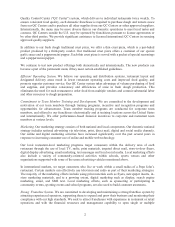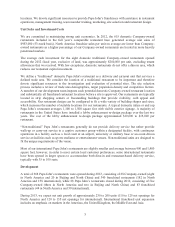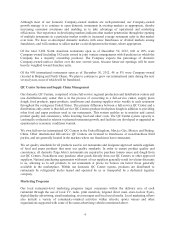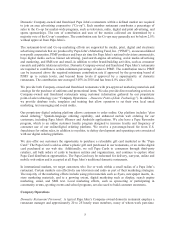Papa Johns 2012 Annual Report Download - page 18
Download and view the complete annual report
Please find page 18 of the 2012 Papa Johns annual report below. You can navigate through the pages in the report by either clicking on the pages listed below, or by using the keyword search tool below to find specific information within the annual report.12
Our success depends on the differentiation of our brand and maintaining the value and quality reputation
of our brand.
Our results depend upon our ability to differentiate our brand and our reputation for quality. Our brand
has been highly rated in U.S. surveys and we strive to build the value of our brand as we develop
international markets. The value of our brand and demand for our products could be damaged by
incidents that harm consumer perceptions of the Company and our brand, such as product recalls, food
safety issues, privacy breaches, and related negative publicity. Social media can be used to promote
adverse consumer perceptions with significantly greater speed and scope than traditional media outlets.
As a result, the value of our brand and the demand for our products could be damaged and have an
adverse effect on our financial results.
We may not be able to execute our strategy or achieve our planned growth targets, which could
negatively impact our business and our financial results.
Our growth strategy depends on the Company’s and our franchisees’ ability to open new restaurants and
to operate them on a profitable basis. Planned growth targets and the ability to operate new and existing
restaurants profitably are affected by economic, regulatory and competitive conditions and consumer
buying habits. Increased commodity or operating costs, including but not limited to employee
compensation and benefits or insurance costs, could slow the rate of new store openings or increase the
number of store closings. Our business is susceptible to adverse changes in local, national and global
economic conditions, which could make it difficult for us to meet our growth targets. Additionally, we or
our franchisees may face challenges securing financing, finding suitable store locations at acceptable
terms or securing required domestic or foreign government permits and approvals.
Our franchisees remain dependent on the availability of financing to remodel or renovate existing
locations or construct and open new restaurants. The reduced availability of credit has required, and may
continue to require, the Company to provide financing to certain franchisees and prospective franchisees
in order to mitigate store closings or allow new units to open. If we are unable or unwilling to provide
such financing, our results of operations may be adversely impacted. To the extent we provide financing
to franchisees in domestic and international markets, our results could be negatively impacted by the
credit performance of our franchisee loans, particularly if our franchisees encounter worsening economic
or political conditions in their markets.
Our stock price could decline or experience volatility if we do not meet expectations of the market for
earnings per share, comparable store sales, net restaurant openings or revenue growth.
Our results of operations and the operating results of our franchisees may be adversely impacted by
increases in the cost of food ingredients and other commodities.
We are exposed to ongoing commodity volatility, and an increase in the cost, or sustained high levels of
the cost, of cheese or other commodities could adversely affect the profitability of our system-wide
restaurant operations, particularly if we are unable to increase the selling price of our products to offset
costs. Cheese, historically representing 35% to 40% of our food cost, and other commodities can be
subject to significant cost fluctuations due to weather, availability, global demand and other factors that
are beyond our control. Additionally, increases in fuel, utility, and insurance costs could adversely affect
the profitability of our restaurant and QC Center businesses. Our domestic franchisees buy substantially
all of their food products from our QC Center business. We have pricing arrangements with certain of our
suppliers that reset on time frames ranging from monthly to annually. For our Company-owned
restaurants, we also have forward pricing arrangements for a portion of our cheese purchases.
























